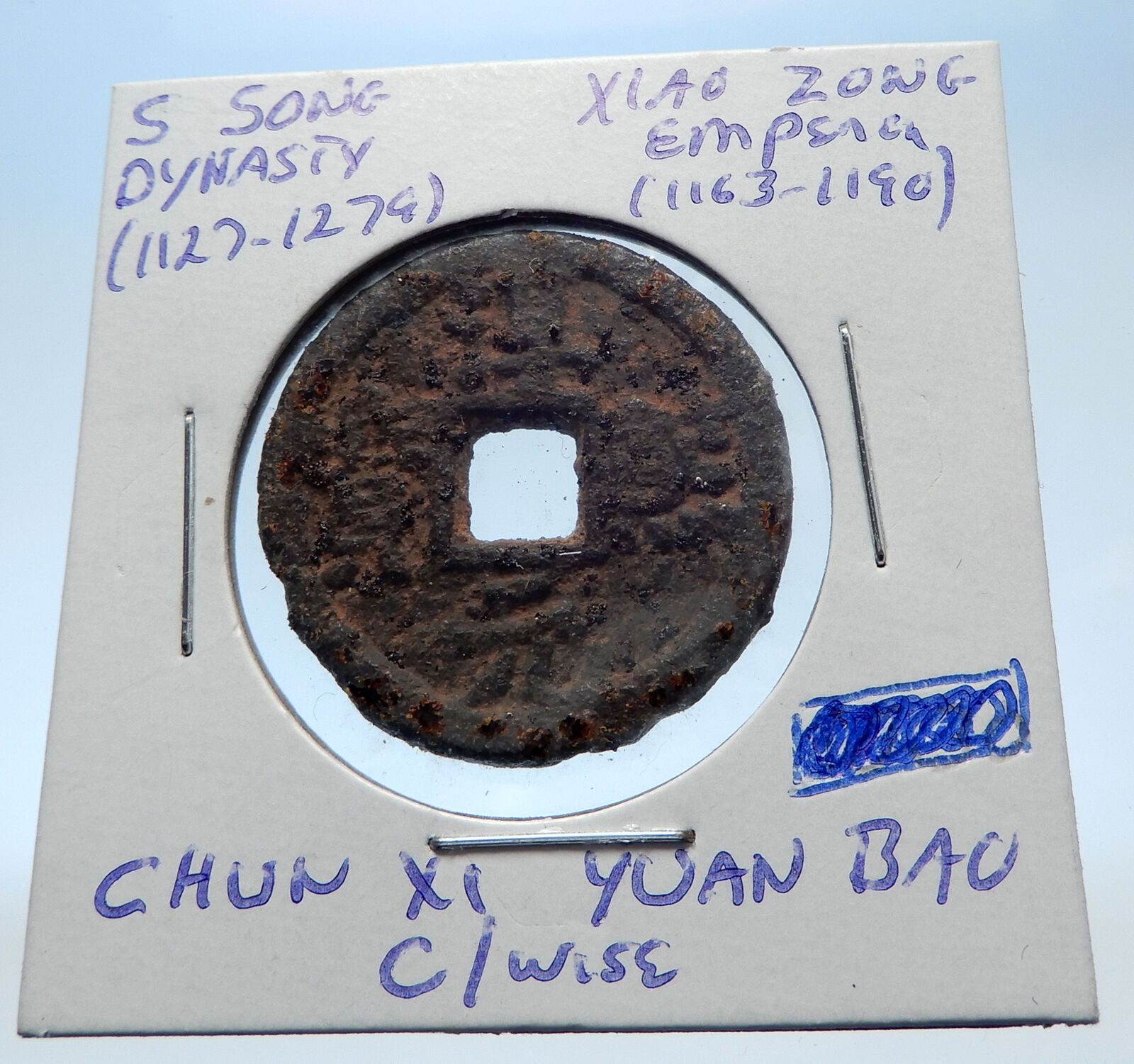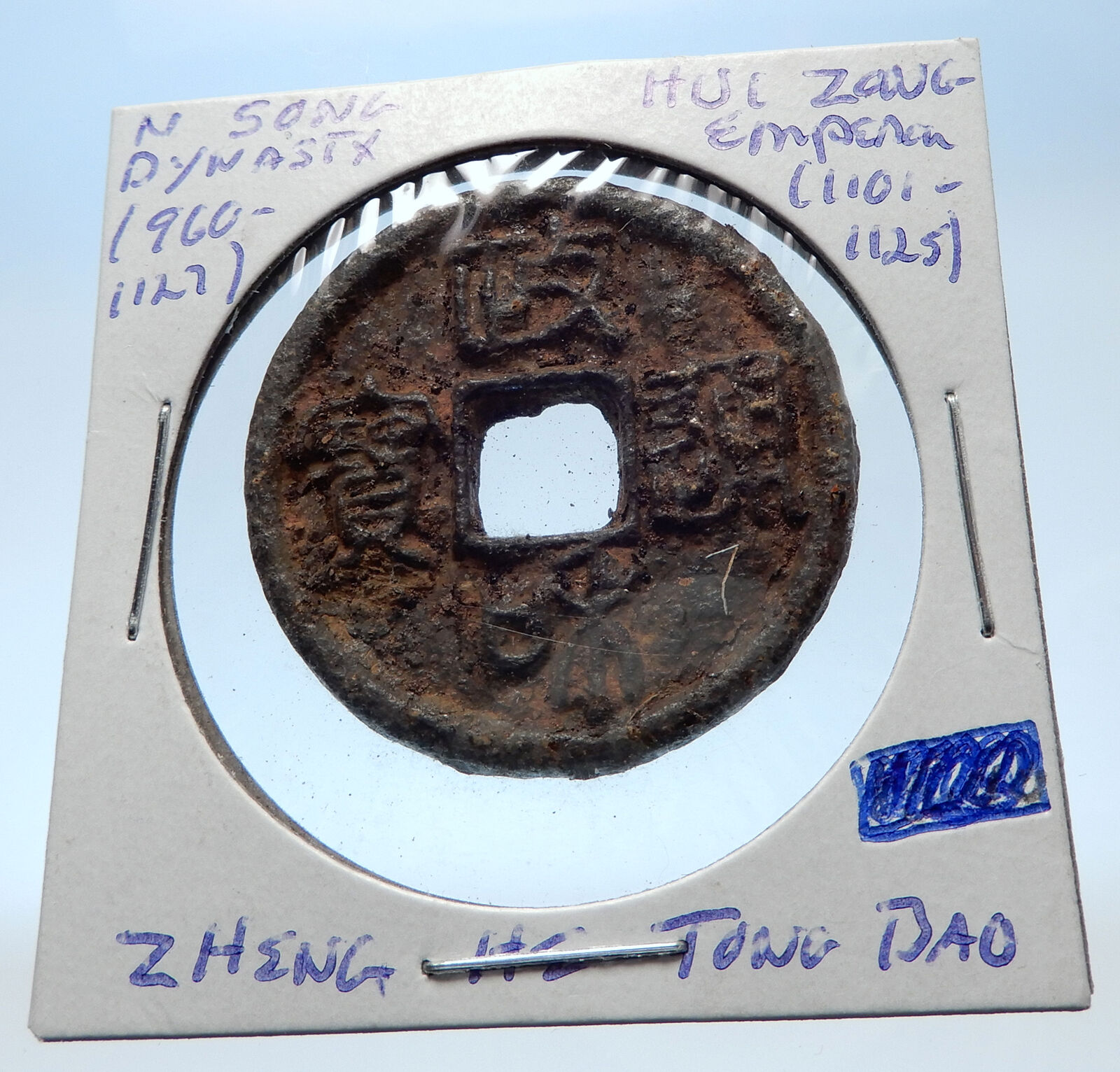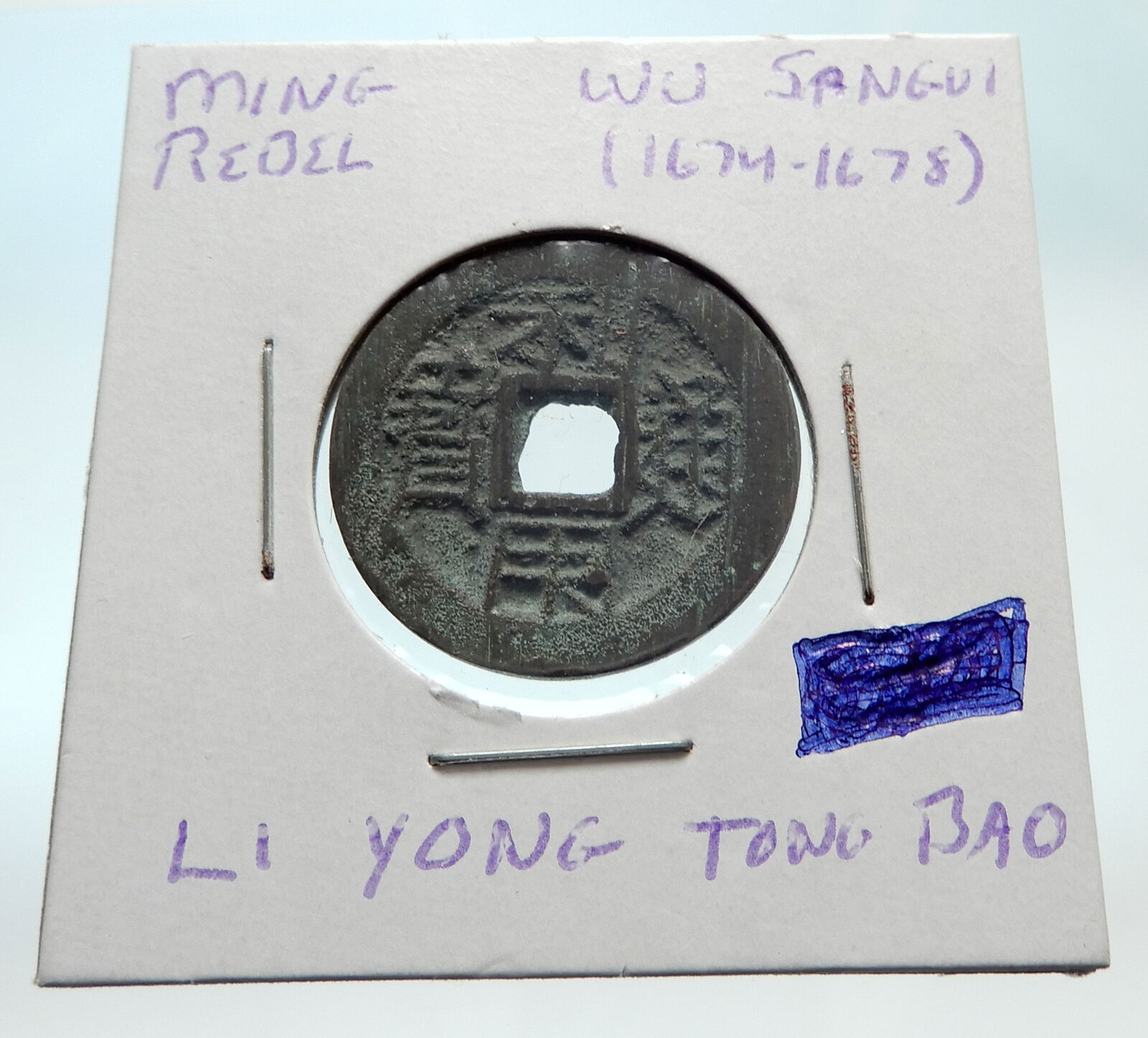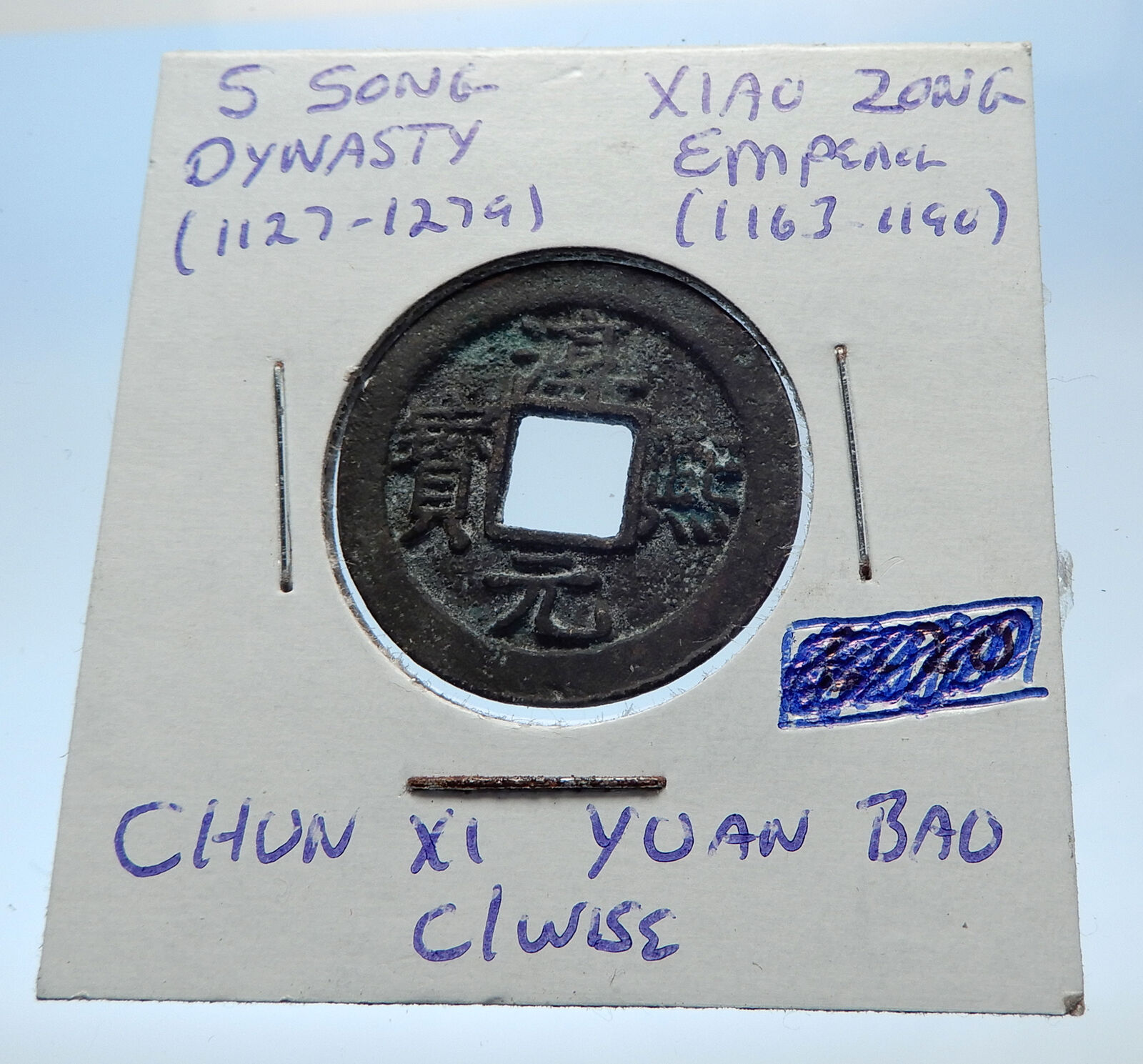|
China –
Later Zhou Dynasty (951-960)
Wang Jian: Emperor 907-918 AD
Bronze Tong
Zheng Yuan Bao
Cash Token 24mm, Struck 907-918 AD
Reference: H# 15.35
Chinese Symbols.
Large Characters.
You are bidding on the exact item pictured, provided with a Certificate of Authenticity and Lifetime Guarantee of Authenticity.
Wang Jian (Chinese: 王建; 847 – July 11, 918), courtesy name Guangtu (光圖), formally Emperor Gaozu of (Former) Shu ((前)蜀高祖), was the founding emperor of Former Shu, one of the ten kingdoms of the Five Dynasties and Ten Kingdoms period of Chinese history. He started his career as an army officer under the Tang dynasty eunuch generals Yang Fuguang and Tian Lingzi, eventually seizing control of the modern Sichuan and Chongqing region, founding his state after Tang’s destruction.
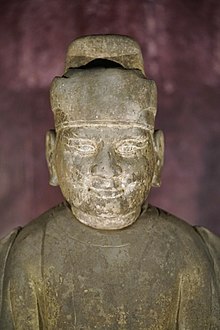 It was said that while Wang Jian was illiterate, he favored talking with the intelligentsia, and was often retaining members of Tang aristocratic families so that they could pass on their knowledge. However, as his oldest son Wang Zongren (王宗仁) was disabled from his childhood, he created his second son Wang Zongyi initially the Prince of Sui while creating no other son imperial princes, hinting that Wang Zongyi was to be his heir. (He would not create his other sons imperial princes until late 910; a few, but not most, of his adoptive sons would be created imperial princes as well then.) It was said that while Wang Jian was illiterate, he favored talking with the intelligentsia, and was often retaining members of Tang aristocratic families so that they could pass on their knowledge. However, as his oldest son Wang Zongren (王宗仁) was disabled from his childhood, he created his second son Wang Zongyi initially the Prince of Sui while creating no other son imperial princes, hinting that Wang Zongyi was to be his heir. (He would not create his other sons imperial princes until late 910; a few, but not most, of his adoptive sons would be created imperial princes as well then.)
Wang Jian made Wang Zongji and Wei Zhuang his chancellors. However, Wang Zongji viewed himself as the oldest among the adoptive sons and a potential heir, and he was arrogant toward all other officials, including Wang Jian’s close associate Tang Daoxi the director of palace communications. In 908, unhappy about this situation, Wang Jian gave Wang Zongji the honorific title of Taishi (太師) but stripped him of his chancellor status, replacing him with Zhang Ge. When Wang Zongji submitted a petition in which he challenged Wang Jian to name either him or Wang Zongyi crown prince, Wang Jian was offended; when Wang Zongji further offended him at a face-to-face meeting, Wang Jian had Wang Zongji put to death and then created Wang Zongyi crown prince.
In late 908, Qi, Former Shu, and Jin forces launched a joint attack on Chang’an, but after the Later Liang generals Liu Zhijun and Wang Zhongshi (王重師) defeated Qi forces, the Former Shu and Jin forces withdrew.
Also in 908, Wang Jian created his wife Lady Zhou empress. He would also create his concubines Consort Zhang (Wang Zongyi’s mother) Guifei and two Consorts Xu (who were sisters) Xianfei and Defei respectively; he thereafter favored the Consorts Xu greatly.
In 910, Wang Zongyi and Tang began to have disputes with each other. Not wanting to see an open struggle between them, Wang Jian sent Tang out of the capital to serve as the military governor of Shannan West. Meanwhile, he continued his alliance with Qi, sending Qi such supplies as tea, silk, and textiles, but when Li Maozhen requested that he cede Ba (巴州, in modern Bazhong, Sichuan) and Jian (劍州, in modern Guangyuan) Prefectures, he refused. In 911, though, the Shu-Qi alliance would break up over marital relations — as Wang’s daughter, who had married Li Jichong and whom Wang had created the Princess of Puci, wrote a letter to Wang complaining of Li Jichong’s arrogance and drunkenness. Wang thus summoned her back to Chengdu, ostensibly just to visit the family. When she arrived at Chengdu, he kept her and refused to return her to Li Jichong. Li Maozhen, in anger, broke off the alliance with Shu.
Later in the year, Li Maozhen amassed troops on the Shu-Qi border. Wang Jian reacted by mobilizing a large force and commissioning Wang Zongkan as the overall commander, with Wang Zongyou, Wang Zonghe, and Tang as his deputies, to counteract the Qi move. Qi forces subsequently attacked Xingyuan but were repelled by Tang. Wang Jian himself headed for Li Prefecture, while leaving Wang Zongyi in command at Chengdu. After several victories by Shu forces over Qi forces, Wang Jian returned to Chengdu and left Wang Zonghui in charge at Li Prefecture. After he did, however, Li Jichong and Liu Zhijun (who had by this point surrendered to Qi and was serving as a Qi general) jointly attacked Xingyuan, nearly capturing it. Wang Jian sent Wang Zonghui and Wang Zongbo to relieve the siege, and they defeated Qi forces in conjunction with Tang. However, Qi forces continued to threaten Xingyuan and the nearby Anyuan Base (安遠), and it was not until Wang Jian himself went to Xingyuan late in the year to aid the Xingyuan and Anyuan forces that Shu forces were able to decisively defeat Qi forces, forcing them to withdraw. (Hearing of the war between Qi and Shu, Zhu Quanzhong wanted to take advantage of it, and sent messengers to Wang Jian, calling him “older brother.” There was no record of what Wang Jian’s reactions were.)
Late reign
In 913, Tang Daoxi returned from Shannan West and again served as director of palace communications. His old rivalry with Wang Zongyi (whose name had been changed to Wang Yuanying by this point) soon flared up, as Wang Yuanying accused him of crimes that made it inappropriate to again serve that point. Wang Jian, while displeased, gave Tang the honorary post of advisor to Wang Yuanying instead.
In fall 913, Wang Jian planned a vacation away from Chengdu for the Qixi Festival. Also for the occasion, the night before Wang Yuanying held a feast for the imperial princes and high-level officials, but three invitees — Wang Jian’s adoptive son Wang Zonghan (王宗翰) the Prince of Ji, and the officials Pan Qiao (潘峭, who succeeded Tang as the director of palace communications) and Mao Wenxi (the chief imperial scholar) — did not attend. Wang Yuanying, in anger, accused Pan and Mao in absentia of alienating his brothers from him. Meanwhile, Wang Yuanying’s trusted officers Xu Yao (徐瑤) and Chang Qian (常謙) were gazing at Tang. Tang, in fear, fled from the feast. The next day, both Wang Yuanying and Tang made accusations against each other, and the accusations soon flared up into military confrontations, as Wang Jian agreed to Tang’s request to mobilize the regular troops to defend the palace (rather than the imperial guards, who were formally under Wang Yuanying’s command). Upon hearing that the regular troops had been mobilized, Wang Yuanying mobilized his own Tianwu Army (天武軍) and attacked Tang. Tang initially resisted, but tried to retreat when an arrow hit him. The crown prince’s troops then routed his, killing him, and many of the troops under Tang were killed. In response, at Pan Kang’s suggestion, Wang Jian summoned his adoptive sons Wang Zongkan (王宗侃), Wang Zonghe (王宗賀), and Wang Zonglu (王宗魯), ordering them to launch an attack against Wang Yuanying’s troops. They did so, along with another adoptive son, Wang Zong’an (王宗黯). They killed Xu in battle. Chang and Wang Yuanying fled to Longyao Pond (龍躍池) and hid on a boat there. The next morning, Wang Yuanying came out of hiding and requested food from the boat owner. This was reported to Wang Jian, and he dispatched Wang Zonghan to try to comfort Wang Yuanying. However, before Wang Zonghan arrived at Longyao Pond, Wang Yuanying was killed by his own guard. Wang Jian initially mourned Wang Yuanying bitterly, but later decided that without declaring Wang Yuanying a renegade, he could not comfort the people, and therefore demoted Wang Yuanying to commoner rank, although, apparently at Wang Jian’s direction, Wang Zonghan had Wang Yuanying’s killer executed. Many of Wang Yuanying’s associates were killed or exiled.
Late in the year, Wang Jian considered whom to create as the new crown prince, as Pan repeatedly requested him to. He initially considered Wang Zonglu (王宗輅) the Prince of Ya, whom he considered most like himself, and Wang Zongjie (王宗傑) the Prince of Xin, whom he considered the most talented. However, Consort Xu the Xianfei wanted her son Wang Zongyan the Prince of Zheng, the youngest, created crown prince. She thus entered into an alliance with Tang Wenyi (唐文扆) the overseer of the imperial stables and Zhang Ge. Zhang falsely informed a number of high-level officials, including Wang Zongkan, that Wang Jian had settled on Wang Zongyan but wanted their public support. He then drafted a petition to have Wang Zongyan made crown prince, and had Wang Zongkan and the others sign the petition. When Wang Jian received the petition, believing that Wang Zongyan did have the high-level officials’ support, he, despite his doubts about Wang Zongyan’s abilities, created Wang Zongyan crown prince.
In 914, Gao Jichang the Later Liang military governor of Jingnan Circuit wanted to attack Former Shu to recapture the four prefectures that previously belonged to Jingnan. He first started by attacking Kui Prefecture. The prefect of Kui Prefecture, Wang Chengxian (王成先), despite the refusal by his superior Wang Zongshou (王宗壽) the Prince of Jia (Wang Jian’s nephew) to provide supplies, was able to repel the Jingnan attack. When he subsequently tried to submit a secret report to Wang Jian accusing Wang Zongshou of holding back supplies, though, Wang Zongshou intercepted the report, arrested him, and executed him. Later in the year, Wang considered reacting by destroying a dam to flood Jingnan, but at Mao’s urging, under the argument that there would be too many civilian casualties, he did not do so. Also late in 914, when Changhe (also known as Nanzhao) attacked Li Prefecture (黎州, in modern Ya’an, Sichuan), Wang Jian sent his adoptive sons Wang Zongfan (王宗範) and Wang Zongbo, as well as Wang Zongshou, to respond, and they defeated Changhe forces, forcing their withdrawal. When Wang Zongfan, Wang Zongbo, and Wang Zongshou considered further advancing into Changhe territory, Wang Jian recalled them. It was said that thereafter, Changhe did not dare to again attack Shu territory.
In fall 915, Wang Jian launched a major attack against Qi, sending Wang Zongwan, assisted by Wang Zongbo, to attack Qin Prefecture (秦州, the capital of Tianxiong), and Wang Zongyao, assisted by Wang Zonghan, to attack Feng Prefecture (鳳州, in modern Baoji). Both attacks were successful, as Feng Prefecture fell, and Li Jichong surrendered Qin. With his wife and children among the captives at Qin, Liu Zhijun, who was commanding Qi forces in resisting the Shu attack, also surrendered, leaving Qi with little more territory than its capital Fengxiang.
In fall 916, Wang Jian prepared another major attack against Qi, sending Wang Zongwan, assisted by Wang Zonghan and Wang Zongshou to launch their attack from Feng, while sending Wang Zongbo, assisted by Liu, Wang Zongchou (王宗儔), and Tang Wenyi’s brother Tang Wenyi (唐文裔, note different character), to launch their attack from Qin. They captured Baoji (寶雞, in modern Baoji) and put Fengxiang under siege. The siege, however, was hampered by snowstorms, and Wang Jian decided to lift the siege and recall the forces. He then declared a change of the state’s name from Shu to Han.
In 917, a power struggle developed between Tang Wenyi, who was aligned with Zhang, and Mao. Based on Tang’s accusations, Wang Jian exiled Mao and confiscated his assets, and also demoted the chancellor Yu Chuansu. Also, fearing Liu’s abilities, he falsely accused Liu of treason and executed Liu.
In early spring 918, Wang Jian changed the name of the state from Han back to Shu.
The Later Zhou (/dʒoʊ/; simplified Chinese: 后周; traditional Chinese: 後周; pinyin: Hòu Zhōu) was the last in a succession of five dynasties that controlled most of northern China during the Five Dynasties and Ten Kingdoms period, which lasted from 907 to 960 and bridged the gap between the Tang Dynasty and the Song Dynasty.
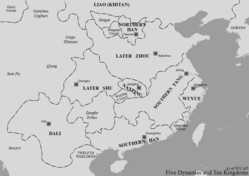 Guo Wei, a Han Chinese, served as the Assistant Military Commissioner at the court of the Later Han, a regime ruled by Shatuo Turks. Liu Chengyou came to the throne of the Later Han in 948 after the death of the founding emperor, Gaozu. Guo Wei led a successful coup against the teenage emperor and then declared himself emperor of the new Later Zhou on New Year’s Day in 951. Guo Wei, a Han Chinese, served as the Assistant Military Commissioner at the court of the Later Han, a regime ruled by Shatuo Turks. Liu Chengyou came to the throne of the Later Han in 948 after the death of the founding emperor, Gaozu. Guo Wei led a successful coup against the teenage emperor and then declared himself emperor of the new Later Zhou on New Year’s Day in 951.
Guo Wei, posthumously known as Emperor Taizu of Later Zhou, was the first Han Chinese ruler of northern China since 923. He is regarded as an able leader who attempted reforms designed to alleviate burdens faced by the peasantry. His rule was vigorous and well-organized. However, it was also a short reign. His death from illness in 954 ended his three-year reign. His adoptive son Chai Rong (also named Guo Rong) would successes his reign.
Guo Rong, posthumously known as Emperor Shizong of Later Zhou, was the adoptive son of Guo Wei. Born Chai Rong, he was the son of his wife’s elder brother. He ascended the throne on the death of his adoptive father in 954. His reign was also effective and was able to make some inroads in the south with victories against the Southern Tang in 956. However, efforts in the north to dislodge the Northern Han, while initially promising, were ineffective. He died an untimely death in 959 from an illness while on campaign.
Guo Rong was succeeded by his seven-year-old son upon his death. Soon thereafter Zhao Kuangyin usurped the throne and declared himself emperor of the Great Song Dynasty, a dynasty that would eventually reunite China, bringing all of the southern states into its control as well as the Northern Han by 979.
Cash was a type of coin of China and East Asia, used from the 4th century BC until the 20th century AD. Originally cast during the Warring States period, these coins continued to be used for the entirety of Imperial China as well as under Mongol, and Manchu rule. The last Chinese cash coins were cast in the first year of the Republic of China. Generally most cash coins were made from copper or bronze alloys, with iron, lead, and zinc coins occasionally used less often throughout Chinese history. Rare silver and gold cash coins were also produced. During most of their production, cash coins were cast but, during the late Qing dynasty, machine-struck cash coins began to be made. As the cash coins produced over Chinese history were similar, thousand year old cash coins produced during the Northern Song dynasty continued to circulate as valid currency well into the early twentieth century.
In the modern era, these coins are considered to be Chinese “good luck coins”; they are hung on strings and round the necks of children, or over the beds of sick people. They hold a place in various superstitions, as well as Traditional Chinese medicine, and Feng shui. Currencies based on the Chinese cash coins include the Japanese mon, Korean mun, Ryukyuan mon, and Vietnamese văn.
|





 It was said that while Wang Jian was illiterate, he favored talking with the intelligentsia, and was often retaining members of Tang aristocratic families so that they could pass on their knowledge. However, as his oldest son Wang Zongren (王宗仁) was disabled from his childhood, he created his second son Wang Zongyi initially the Prince of Sui while creating no other son imperial princes, hinting that Wang Zongyi was to be his heir. (He would not create his other sons imperial princes until late 910; a few, but not most, of his adoptive sons would be created imperial princes as well then.)
It was said that while Wang Jian was illiterate, he favored talking with the intelligentsia, and was often retaining members of Tang aristocratic families so that they could pass on their knowledge. However, as his oldest son Wang Zongren (王宗仁) was disabled from his childhood, he created his second son Wang Zongyi initially the Prince of Sui while creating no other son imperial princes, hinting that Wang Zongyi was to be his heir. (He would not create his other sons imperial princes until late 910; a few, but not most, of his adoptive sons would be created imperial princes as well then.) Guo Wei, a Han Chinese, served as the Assistant Military Commissioner at the court of the Later Han, a regime ruled by Shatuo Turks. Liu Chengyou came to the throne of the Later Han in 948 after the death of the founding emperor, Gaozu. Guo Wei led a successful coup against the teenage emperor and then declared himself emperor of the new Later Zhou on New Year’s Day in 951.
Guo Wei, a Han Chinese, served as the Assistant Military Commissioner at the court of the Later Han, a regime ruled by Shatuo Turks. Liu Chengyou came to the throne of the Later Han in 948 after the death of the founding emperor, Gaozu. Guo Wei led a successful coup against the teenage emperor and then declared himself emperor of the new Later Zhou on New Year’s Day in 951.

